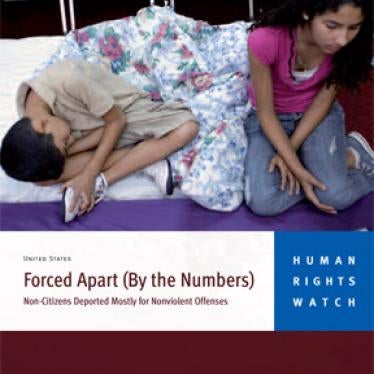(Washington DC) - The ruling by the Inter-American Commission on Human Rights on August 2, 2010, that US deportation hearings violate legal residents' rights to family unity sends a clear signal that reforms are needed in US immigration law, Human Rights Watch said today. Human Rights Watch had filed an amicus (friend of the court) brief in the case Wayne Smith and Hugo Armendariz v. United States.
"People who have lived in the United States legally for years should have fair hearings before their families are torn apart by deportation," said Alison Parker, US program director at Human Rights Watch. "The Inter-American Commission ruling is another nail in the coffin of the dysfunctional, inefficient, and overly broad immigration laws in the United States."
The commission's ruling - called a "report" - was based on the cases of Wayne Smith and Hugo Armendariz, lawful permanent residents of the United States for 25 and 35 years respectively, who were deported from the United States for nonviolent criminal offenses that had occurred many years earlier. A 2008 report by Human Rights Watch, "Forced Apart (by the Numbers)," estimated that more than one million family members have been separated from their loved ones by such deportations.
In the Armendariz case, a US judge had determined that he was subject to mandatory deportation and ordered him deported to Mexico even though he was married to a US citizen, had a child and many other family members who were US citizens, had lived over 90 percent of his life in the United States - since age 2 - and was unable to read or write in his language of origin.
"If the law doesn't let the judge even take into account a legal resident's family, their American children's needs, or their roots in the US, a fair hearing on the issues is impossible," Parker said. "Protecting human rights at immigration hearings is simple: put all the concerns on the table, and let immigration judges judge."
The commission found that when a person like Armendariz faces deportation, a government must weigh its right to deport against a person's right to remain. Some of the factors judges must be able to consider, but are prevented from considering under current US law, are:
- The age at which the person entered and the length of time in the US;
- Family, social, and other ties to the US;
- The severity of the person's crime that led to the deportation case, the time elapsed since the offense, and the person's rehabilitation, if any; and
- Possible hardship for the person's citizen children, spouses, or other family members if the person is deported.
Human Rights Watch called on President Barack Obama and the US Congress to revise immigration laws to reduce the focus on deporting immigrants who are in the country legally. At a minimum, immigration law should be amended to permit legal immigrants facing deportation to ask a judge to allow them to remain in the United States when their crimes are relatively minor and their connections to the United States - especially their family ties - are strong.
The Inter-American Commission on Human Rights is the principal body of the inter-American system charged with human rights protection. The commission investigates petitions of alleged violations of human rights by the member nations of the Organization of American States.







